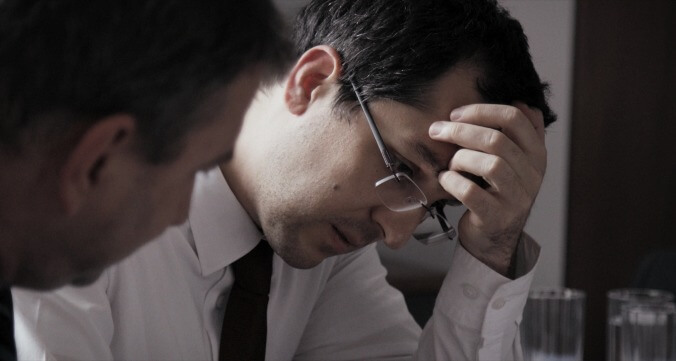A medical tragedy exposes a government’s deep-rooted flaws in the timely documentary Collective


Note: The writer of this review watched Collective on a digital screener from home. Before making the decision to see it—or any other film—in a movie theater, please consider the health risks involved. Here’s an interview on the matter with scientific experts.
Early in the 21st century, a new wave of Romanian filmmakers like Cristian Mungiu, Cristi Puiu, and Corneliu Porumboiu began drawing international recognition for their gripping, docu-realistic dramas, addressing the power imbalances and the social dysfunction plaguing their country, post-Communism. The best way to describe Alexander Nanau’s documentary Collective is to say that it’s a non-fiction version of those new Romanian classics: like The Death Of Mr. Lazarescu or 4 Months, 3 Weeks And 2 Days, but with real people. It’s a taut, intense procedural, with a resonant story that simultaneously follows a journalistic investigation and an attempt to fix a fatally dysfunctional medical bureaucracy—all while criminal organizations, corrupt politicians, and rabble-rousing television hosts work in concert to stymie any real reform.
The title of Collective refers to the Collectiv nightclub in Bucharest, where in 2015 a fire sparked by a metalcore band’s pyrotechnics show killed dozens. The tragedy shocked the conscience of the public, who demanded the government answer for its lax, backslap-and-handshake approach to regulating businesses. And then another crisis hit: Dozens more people who were injured in the Collectiv fire started dying in hospitals, from infections that took hold due to unsanitary conditions. An institutional purge ensued, and a new administration took over on a provisional basis.
Much of Collective’s first half follows a team of reporters from the newspaper the Sports Gazette, as they chase whistleblower tips and hustle to expose the truth about a widespread practice: politicians giving hospital manager jobs to unqualified but well-connected individuals, who then took bribes from shady characters and stocked their shelves with cheap, watered-down antiseptics. Nanau introduces these reporters without any direct-to-camera interviews or narration. Aside from the occasional (and helpful) bit of onscreen text to bring non-Romanians up to speed, he mostly drops the audience into the action, turning his cameras on intrepid journalists as they sit in conference rooms or on stakeouts, piecing together scoops.
Similarly, Nanau doesn’t signal the big shift his film takes around the middle of its running time, when one of the bureaucrats the Sports Gazette is covering becomes Collective’s new main subject. Vlad Voiculescu, the country’s new health minister—one of the officials put in charge temporarily—is introduced as a guy who’s under-informed and overmatched, giving weak, canned answers to the media’s outraged questions. But as he begins to understand the horrifying scope of the hospital crisis, Voiculescu genuinely starts trying to make a difference. And that’s where his real trouble starts.
Nanau is unsentimental toward most of the men and women he follows. He’s not saluting heroes; he’s focusing primarily on people who care enough to do their jobs properly. If there are villains in Collective, it’s the old-guard bureaucrats and their slick TV mouthpieces, who have a lot of experience in redirecting public outrage—distracting voters until they can get the graft going again. Rather than owning up to their past failures, they accuse the Sports Gazette of scaring people away from getting medical care, and they concoct a new scandal out of thin air to sully Voiculescu’s reputation. It’s all disturbingly effective, and it may ring familiar to Americans who’ve seen their political debates rendered simplistic and misleading by cable news.
Collective has a dispassionate, “just the facts” tone—a little like an old Dragnet episode, minus Jack Webb’s punchy narration. But it’s still an emotionally wrenching experience. The investigatory legwork is riveting to watch. The political mudslinging is infuriating. The footage of the smoldering Collectiv ceiling becoming an instantaneous inferno is alarming. The pictures of unattended, maggot-infested wounds are stomach-turning.
More importantly, Nanau keeps the audience aware of the real stakes to all this journalistic digging and political gamesmanship. Throughout the film, he returns regularly to Tedy Ursuleanu, a Collectiv burn victim who has turned her experiences into art, forcing others to face what becomes of malfeasance and public indifference. Her work—like this searing and all-too-relevant documentary—is a reminder that elections have consequences.